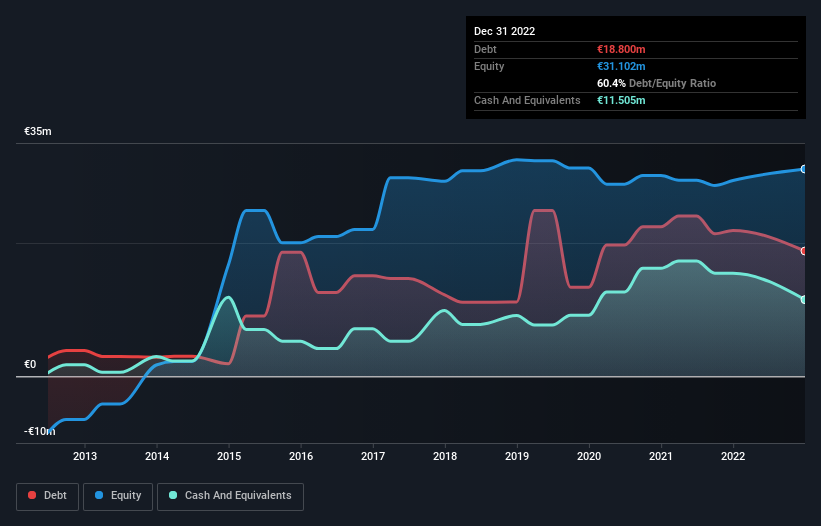Howard Marks put it nicely when he said that, rather than worrying about share price volatility, 'The possibility of permanent loss is the risk I worry about... and every practical investor I know worries about.' It's only natural to consider a company's balance sheet when you examine how risky it is, since debt is often involved when a business collapses. We note that Prologue S.A. (EPA:ALPRG) does have debt on its balance sheet. But the real question is whether this debt is making the company risky.
What Risk Does Debt Bring?
Debt assists a business until the business has trouble paying it off, either with new capital or with free cash flow. Ultimately, if the company can't fulfill its legal obligations to repay debt, shareholders could walk away with nothing. However, a more usual (but still expensive) situation is where a company must dilute shareholders at a cheap share price simply to get debt under control. Having said that, the most common situation is where a company manages its debt reasonably well - and to its own advantage. When we examine debt levels, we first consider both cash and debt levels, together.
View our latest analysis for Prologue
How Much Debt Does Prologue Carry?
You can click the graphic below for the historical numbers, but it shows that Prologue had €18.8m of debt in December 2022, down from €21.9m, one year before. On the flip side, it has €11.5m in cash leading to net debt of about €7.30m.

How Healthy Is Prologue's Balance Sheet?
Zooming in on the latest balance sheet data, we can see that Prologue had liabilities of €29.5m due within 12 months and liabilities of €25.6m due beyond that. Offsetting these obligations, it had cash of €11.5m as well as receivables valued at €38.1m due within 12 months. So it has liabilities totalling €5.41m more than its cash and near-term receivables, combined.
This deficit isn't so bad because Prologue is worth €19.1m, and thus could probably raise enough capital to shore up its balance sheet, if the need arose. But we definitely want to keep our eyes open to indications that its debt is bringing too much risk.
We measure a company's debt load relative to its earnings power by looking at its net debt divided by its earnings before interest, tax, depreciation, and amortization (EBITDA) and by calculating how easily its earnings before interest and tax (EBIT) cover its interest expense (interest cover). The advantage of this approach is that we take into account both the absolute quantum of debt (with net debt to EBITDA) and the actual interest expenses associated with that debt (with its interest cover ratio).
Prologue's net debt is sitting at a very reasonable 2.0 times its EBITDA, while its EBIT covered its interest expense just 3.1 times last year. While that doesn't worry us too much, it does suggest the interest payments are somewhat of a burden. Notably, Prologue made a loss at the EBIT level, last year, but improved that to positive EBIT of €1.9m in the last twelve months. There's no doubt that we learn most about debt from the balance sheet. But ultimately the future profitability of the business will decide if Prologue can strengthen its balance sheet over time. So if you want to see what the professionals think, you might find this free report on analyst profit forecasts to be interesting.
But our final consideration is also important, because a company cannot pay debt with paper profits; it needs cold hard cash. So it is important to check how much of its earnings before interest and tax (EBIT) converts to actual free cash flow. Over the last year, Prologue saw substantial negative free cash flow, in total. While that may be a result of expenditure for growth, it does make the debt far more risky.
Our View
Mulling over Prologue's attempt at converting EBIT to free cash flow, we're certainly not enthusiastic. Having said that, its ability to handle its total liabilities isn't such a worry. Looking at the balance sheet and taking into account all these factors, we do believe that debt is making Prologue stock a bit risky. That's not necessarily a bad thing, but we'd generally feel more comfortable with less leverage. When analysing debt levels, the balance sheet is the obvious place to start. However, not all investment risk resides within the balance sheet - far from it. For instance, we've identified 1 warning sign for Prologue that you should be aware of.
When all is said and done, sometimes its easier to focus on companies that don't even need debt. Readers can access a list of growth stocks with zero net debt 100% free, right now.
New: Manage All Your Stock Portfolios in One Place
We've created the ultimate portfolio companion for stock investors, and it's free.
• Connect an unlimited number of Portfolios and see your total in one currency
• Be alerted to new Warning Signs or Risks via email or mobile
• Track the Fair Value of your stocks
Have feedback on this article? Concerned about the content? Get in touch with us directly. Alternatively, email editorial-team (at) simplywallst.com.
This article by Simply Wall St is general in nature. We provide commentary based on historical data and analyst forecasts only using an unbiased methodology and our articles are not intended to be financial advice. It does not constitute a recommendation to buy or sell any stock, and does not take account of your objectives, or your financial situation. We aim to bring you long-term focused analysis driven by fundamental data. Note that our analysis may not factor in the latest price-sensitive company announcements or qualitative material. Simply Wall St has no position in any stocks mentioned.
About ENXTPA:ALPRG
Prologue
A technology company, engages in the provision of software publishing and IT services for large and medium-sized businesses in France, Spain, the United States, and Latin America.
Undervalued with adequate balance sheet.
Market Insights
Community Narratives



